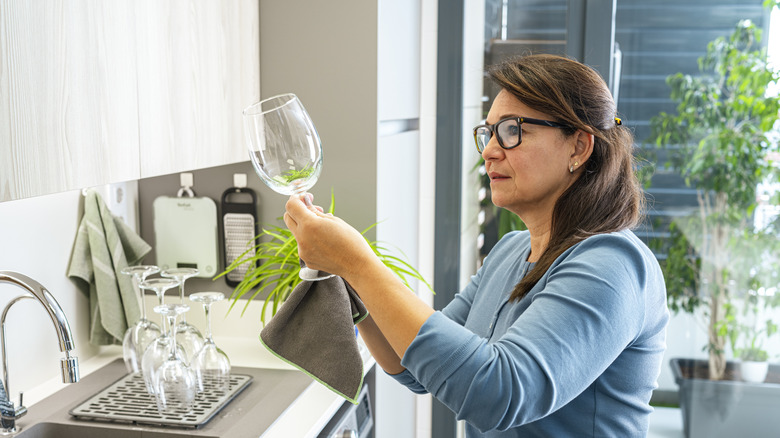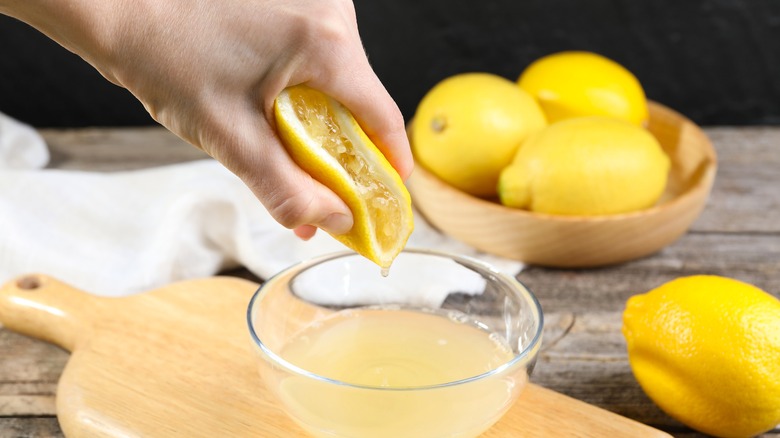De-Grime Cloudy Drinking Glasses With A Simple DIY Solution From Your Kitchen
We may receive a commission on purchases made from links.
A secret to perfectly washed wine glasses is drying them with a clean microfiber cloth as soon as you rinse them out. It's because the longer the water droplets linger on a drinking glass, the higher the chances of them drying in place. This will allow the lime in hard water to build up and mar its pristine surface, leaving it cloudy. But if that's not your style, you just need an easy DIY solution from your kitchen to keep your glasses sparkling. Simply squeeze a lemon and rub its juice over your cloudy drinking glasses to de-grime them.
To understand why this solution works like a charm, House Digest spoke exclusively with Alexis Rochester, investigative chemist, writer, and owner of Chemistry Cachet. Explaining the reason the natural cleaner dissolves unsightly white spots, she clarifies, "It can be effective to clean a cloudy drinking glass with lemon juice due to the citric acid content." That being said, she wouldn't recommend using lemon in this unexpected way if you have other natural cleaners, like powdered citric acid or distilled white vinegar, handy: "I wouldn't use this as the first option though because lemon juice is sticky with pulp, so it can not work as well as using another type of acid (powdered citric acid or vinegar)."
How to use lemon juice to clean your cloudy drinking glasses
If you'd like to use lemon juice to clean your cloudy drinking glasses, Rochester recommends in her exclusive House Digest interview, "After washing your glass, you would simply pour lemon juice into the glass coating all sides. Let it sit for a good 5-10 minutes then rinse with water." However, if you just want to de-grime a few glasses, squeeze a few lemons in a bowl. Dunk a clean microfiber cloth in the solution and rub it against the white spots to eliminate them. "Citric acid works to descale or remove hard water buildup on glass surfaces when you leave it on there for a few minutes." But the cleaner isn't without its caveats. "The cons to using lemon juice is the sugar content making the lemon juice a little sticky and the pulp content. This can make it a little messier to clean with on this type of surface," reveals Rochester.
To avoid the sticky mess, you can combine a cup of water with three tablespoons of lemon juice if you have too many glasses sporting hard water stains. In case you don't clean your glassware by hand or the spots aren't too old, divide a lemon and put both halves in the cutlery slot of your dishwasher. Run a regular cycle (sans dishwashing detergent) to restore your glass' shine. Otherwise, swap out this method with other cleaners because "it also won't be as potent as using powdered citric acid or regular 5% distilled white vinegar."
Alternatives to lemon juice for cleaning drinking glasses
If you'd rather not deal with the sticky film left by lemon juice or you want something more powerful to combat your glassware's cloudiness, Rochester suggests other cleaners in her exclusive chat with House Digest. "Two better options would be using a powdered citric acid. This is much more powerful to use for hard water stains that cause the cloudiness on glasses. You can make a DIY citric acid paste to coat a drinking glass, then let it sit for 5-10 minutes and rinse." Simply dissolve 2 tablespoons of powder citric acid, like Lemi Shine's Food-Grade Citric Acid, in a little water to create a paste for your glasses.
Alternatively, use distilled white vinegar because out of all kinds of vinegar, this one is ideal for cleaning. Outlining the method, she says, "You can also pour 5% white distilled vinegar into a drinking glass to the top, let it sit for 5-10 minutes then rinse it out." Mentioning why these two methods are her favorite, she elaborates, "These two options are usually more successful than using fresh lemon juice, but they can also cover more surface area, so it can be an overall quicker tip for drinking glasses." Don't forget to dry the glasses after you're done to keep the limescale at bay.


